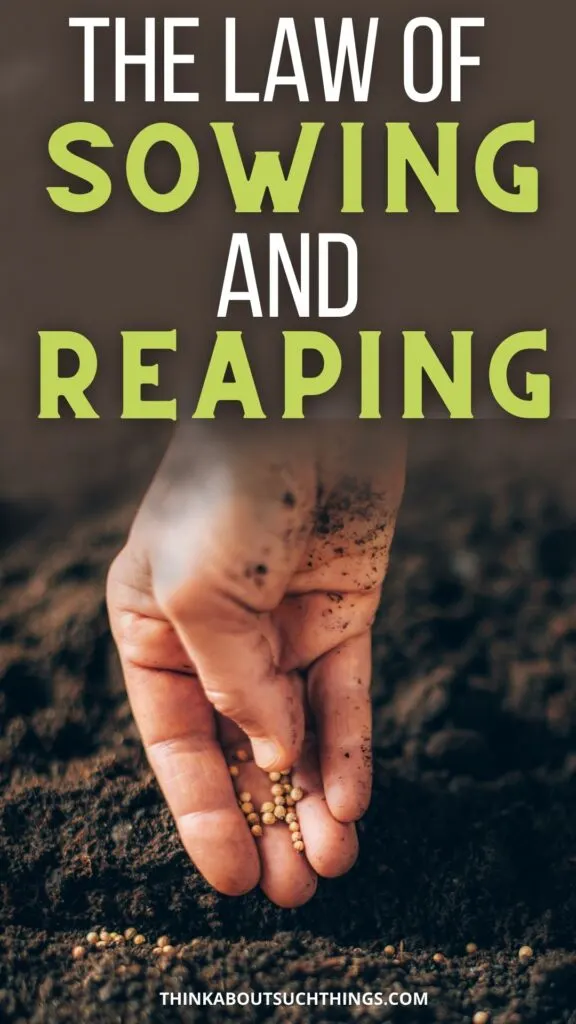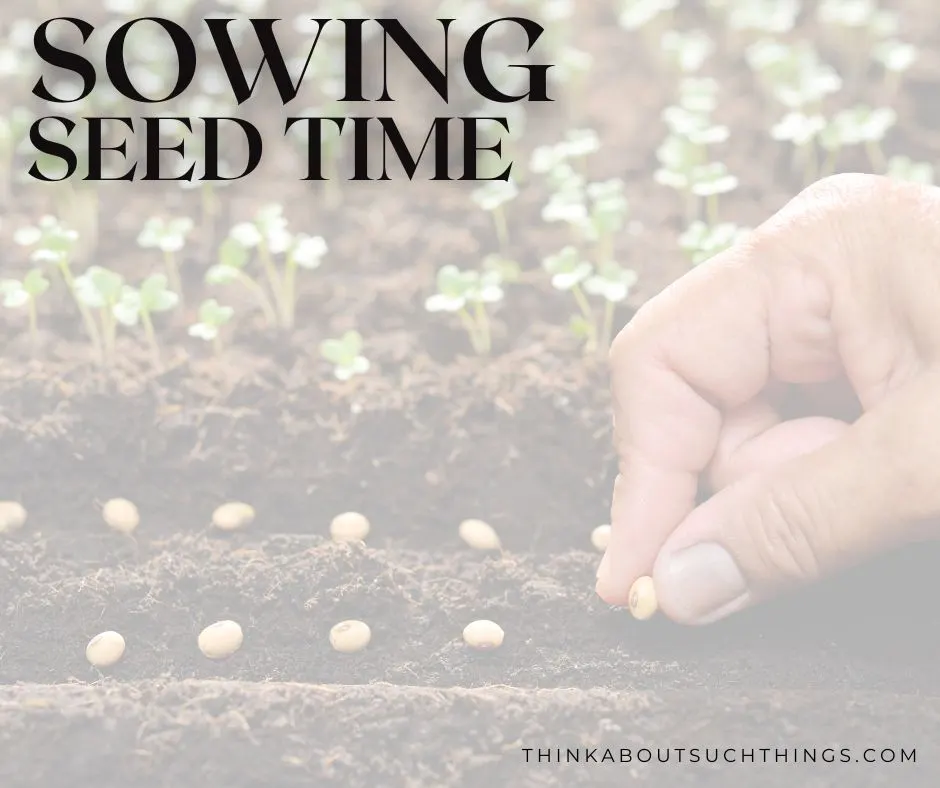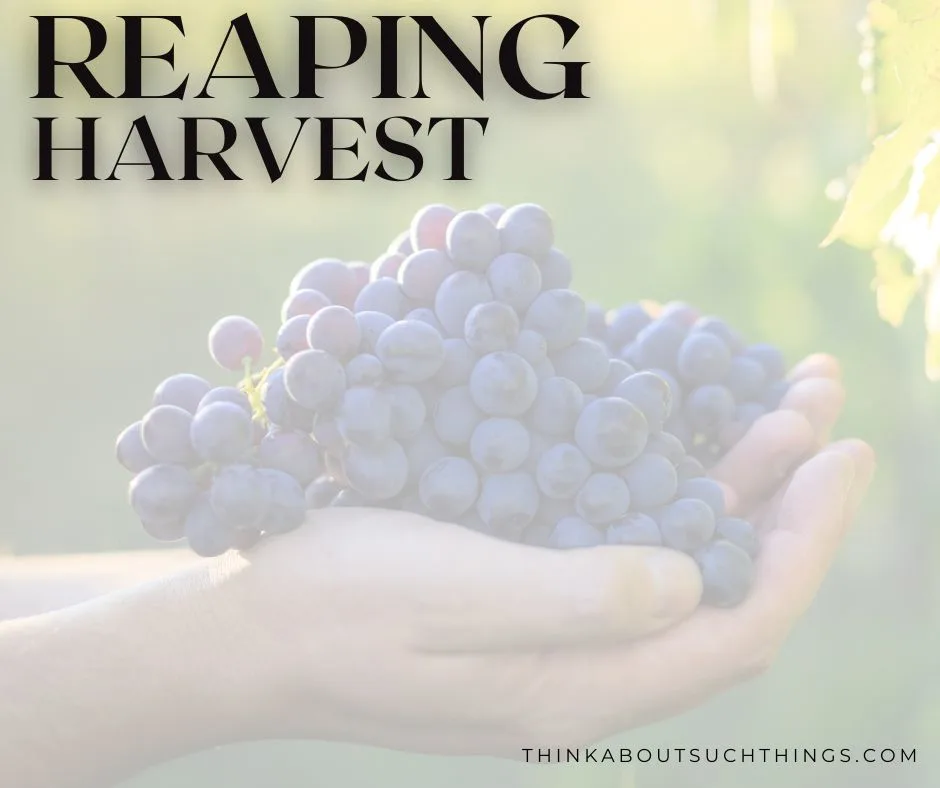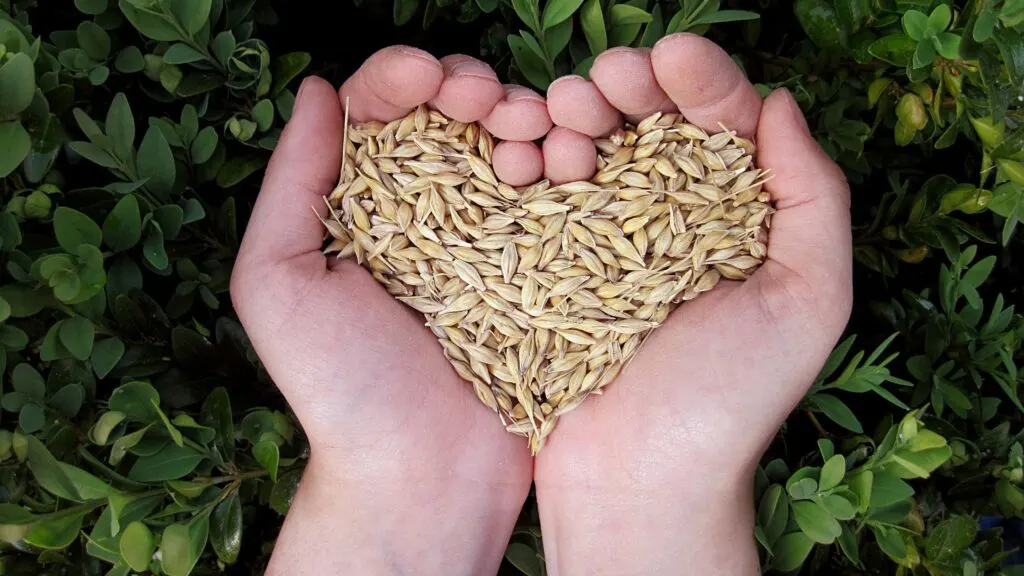In this article, we will explore two powerful Biblical concepts that are related to each other: Sowing and Reaping and Seedtime and Harvest. So, grab your Bible and let’s dig in…
A Biblical concept that often causes some controversy in different denominations is the law of sowing and reaping.
The cause of the controversy is mainly because preachers use the law out of context to get people to give larger tithes and offerings with the promise of reaping a massive harvest afterward.
Unfortunately, that’s a very one-dimensional view of the law of sowing and reaping. There’s much more to it than just financial prosperity and blessing.
So, what is it that the Bible really says about seed time and harvest? And what does it mean by sowing and reaping?
What promise does it hold for the modern believer, and how can it affect our relationship with God?

Seedtime And Harvest In the Bible
What is the difference between sowing and reaping and seedtime and harvest?
Believers tend to confuse the concepts of sowing and reaping with the principle of seed time and harvest. But though the laws are related, there are some differences that we must keep in mind.
The law of seedtime and harvest was spoken into being by God in Genesis 8:22, which says,
“While the earth remains, seed time and harvest, cold and heat, summer and winter, day and night, shall not cease.”
God spoke these words to Noah as part of the covenant He made with him. This happened just after Noah and his family left the ark and made an offering to Him.
God had just sent the flood to wash the earth clean of rampant impurity and sinfulness, and God promised Noah that He would never do that again for as long as the earth remained.
This means that we can’t escape seed time and harvest. It’s an ingrained part of our life on earth, and God ordained it to be so.
Another interesting scripture that reflects the law of seed time and harvest is Ecclesiastes 3:1-2:
“For everything there is a season, and a time for every matter under heaven: a time to be born, and a time to die; a time to plant, and a time to pluck up what is planted….”
The most central point we can see here is that seedtime and harvest are tied to seasons.
There is a season to sow and a season to harvest what you’ve planted.
God explained spiritual seasons and principles through a metaphor that people from the period could understand: farming and earthly seasons.

People of the day knew that you had to sow certain seeds in a particular season to get a harvest, and then you had to wait for the appropriate season to harvest it.
It’s a very basic concept to understand but profound as it is a cycle God created for His creation’s benefit.
Sowing And Reaping In The Bible
The law of sowing and reaping is tied closely with the law of seedtime and harvest, but whereas seedtime and harvest deal mainly with seasons, the law of sowing and reaping has more to do with what you sow.
The most common context in which people quote the law of sowing and reaping is money.
When you sow plenty of money, you will reap plenty more. But, ironically, the Bible has very little to say about the law in this context. Yet we get so hung up on it.
Let’s look at some Bible verses about sowing and reaping.

- Proverbs 22:8: “Whoever sows injustice will reap calamity, and the rod of his fury will fail.”
- Galatians 6:7-8: “Do not be deceived: God is not mocked, for whatever one sows, that will he also reap. For the one who sows to his own flesh will from the flesh reap corruption, but the one who sows to the Spirit will from the Spirit reap eternal life.”
- 2 Corinthians 9:10: “He who supplies seed to the sower and bread for food will supply and multiply your seed for sowing and increase the harvest of your righteousness.”
Of these three scriptures, only the last one refers to any kind of financial sowing and reaping. In the context of 2 Corinthians 9:5-8, Paul asked the believers in Corinth to prepare a financial gift they had promised to support the Christians in Jerusalem.
So I thought it necessary to urge the brothers to visit you in advance and finish the arrangements for the generous gift you had promised. Then it will be ready as a generous gift, not as one grudgingly given.
Remember this: Whoever sows sparingly will also reap sparingly, and whoever sows generously will also reap generously. 7 Each of you should give what you have decided in your heart to give, not reluctantly or under compulsion, for God loves a cheerful giver.
8 And God is able to bless you abundantly, so that in all things at all times, having all that you need, you will abound in every good work.
He was making a few points in these verses:
- It had to be a willing gift, not an exact amount– verse 5.
- Sowing sparingly will lead to a sparing harvest while sowing bountifully would lead to a bountiful harvest – verse 6.
- Each person was to give what they had decided in their heart and not be manipulated or pressured into giving more – verse 7.
- God loves a cheerful giver – verse 7.
- God wants us to abound and have more than enough, not to enrich ourselves but so that we can always give more – verse 8.
So, we can also see that the Bible mentions sowing and reaping in a financial context, but it’s also clear that there’s so much more to it especially when it comes to our spiritual walk with the Lord.
The Implications Of Sowing And Reaping On Modern Believers
Putting it all together, we can conclude several things about sowing and reaping:
- Sowing should never be a once-off event.
The Bible mentions it in the context of a season, and most of us have experienced that there are seasons when we tend to be more prosperous (in various ways, not necessarily just financially) than others.
We should use those seasons to sow what we have plenty of, knowing that a season of harvest will be coming. - Harvesting is also a season.
Farmers know that they shouldn’t expect a harvest immediately; it takes time for seeds to grow and multiply. Many also sow multiple seeds in different seasons to reap a harvest during all seasons. - You will only reap what you sow.
Genesis 1:11-12 says that every seed and plant will reproduce after its own kind, so you can’t personally sow one type of seed and expect another type of harvest. More on that in a moment. - You will reap according to how you sow.
If you sow abundantly, your harvest will be abundant. If you sow sparingly and hold back, you will also reap sparingly. It’s pretty basic, even in gardening. Ten tomato plants will produce more than three tomato plants. - You should sow with cheerfulness because God loves a cheerful giver.
If you can’t give something with cheerfulness, it might be better not to give it; pray for God to renew that part of you.
Just to recap: seedtime and harvest deal with the seasons, this can be natural seasons or spiritual season, sowing and reaping go a little deeper and deals with the type of seed and harvest you will get.
The Seeds A Believer Sows

As we’ve seen, when the Bible talks about sowing and reaping, it’s usually not related to money but to our spiritual lives.
Jesus refers to sowing and harvesting in the context of the gospel. Matthew 13 (the parable of the sower) is an excellent example.
It’s about sowing the seeds of the gospel of the Kingdom. Some of the seeds won’t accomplish much, but others will fall on good ground and bring in a harvest.
We as believers should constantly be sowing the seeds of the gospel but also be ready to help bring in the harvest when some of these seeds have grown.
We can also see from scriptures like Galatians 6 that we can sow to the flesh or the Spirit. Sowing to the flesh (our sinful nature) will lead to disaster, corruption, and death (James 1:15). It is a harvest that steals, kills, and destroys.
But we can also see that sowing to the Spirit will reap everlasting life and see the manifestation of the fruit of the Spirit.
The more time and effort we put into our walk with God, praying, studying the Word, meditating on God’s goodness, and spreading the gospel, the more we will see His life emerge in us through the Holy Spirit.
It takes commitment and perseverance, as does any type of seedtime and harvest. But we have to remember that we are in a relationship with the Almighty God of the Universe, and a relationship can only prosper when we commit time and effort to make it grow.
The more we sow into our relationship with God, the more our spirits will thrive.
To recap:
Sowing and reaping, seedtime, and harvest are concepts that are often made cheap by ministers who want to line their pockets.
And they aren’t wrong; the rule of sowing and reaping also applies to money, but there is so much more to be said about it than what they preach. It should be taught as a whole and not in just one area.
Believers should sow finance into the Kingdom whenever and however they can. It is a Biblical principle, and we can expect a harvest from that if we do it consistently and with a cheerful heart.
But it’s even more important to sow into our spiritual lives and our relationship with the King of kings because that’s where the real reward waits – the rewards we will see here while we are on Earth and rewards we will see once we go home to be with the Lord!
Well, I hope this article was helpful in understanding what seedtime and harvest is and how id differs from sowing and reaping. Feel free to leave me a comment below I would love to hear from my readers!

Melissa is a passionate minister, speaker and an ongoing learner of the Bible. She has been involved in church and vocational ministry for over 18 years. And is the founder of Think About Such Things. She has the heart to equip the saints by helping them get into the Word of God and fall more in love with Jesus. She also enjoys family, cooking, and reading.
She has spoken in churches in California, Oregon, Texas, and Mexico and has been featured in Guidepost Magazine and All Recipes Magazine. Read More…
